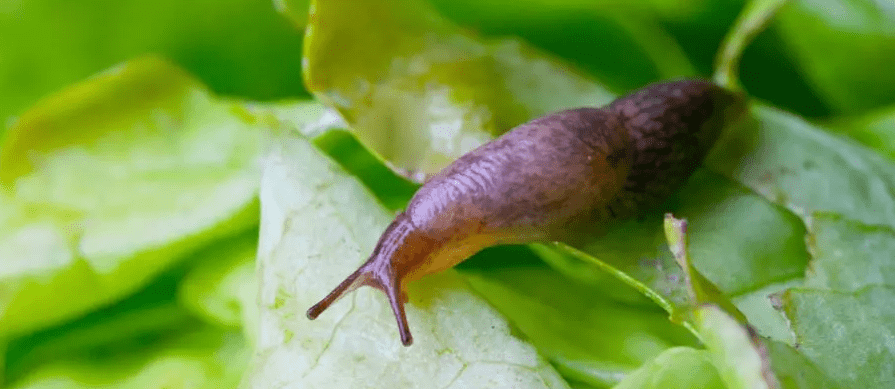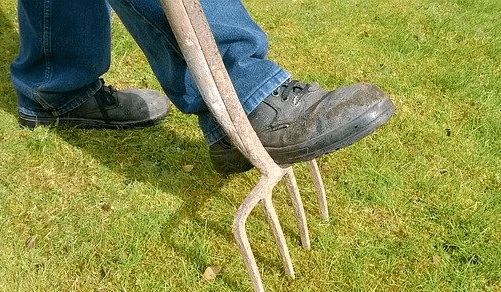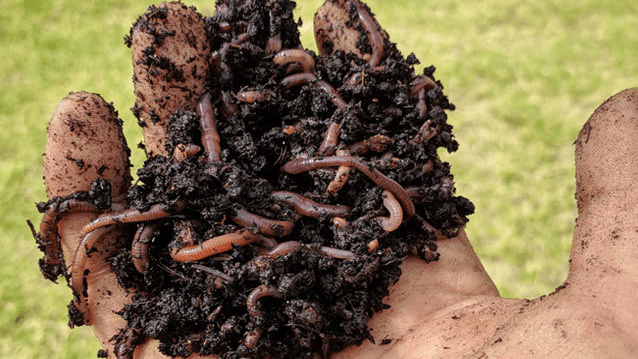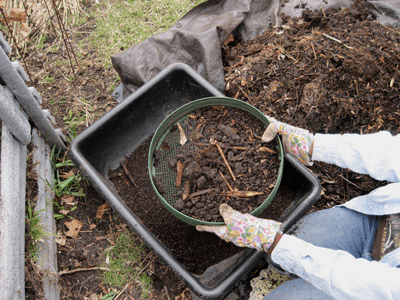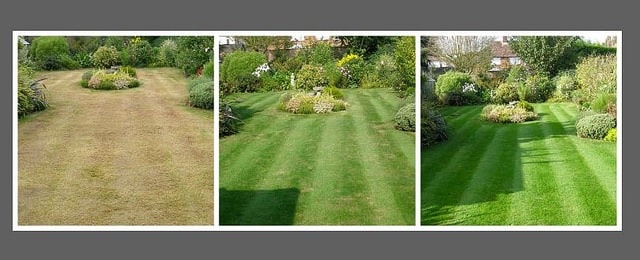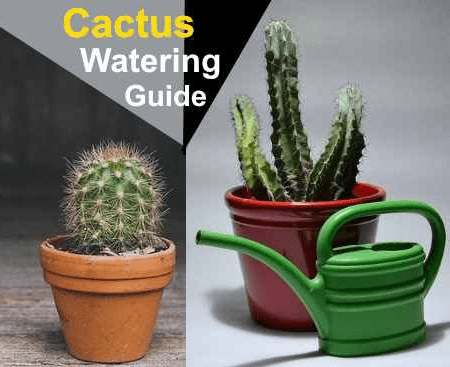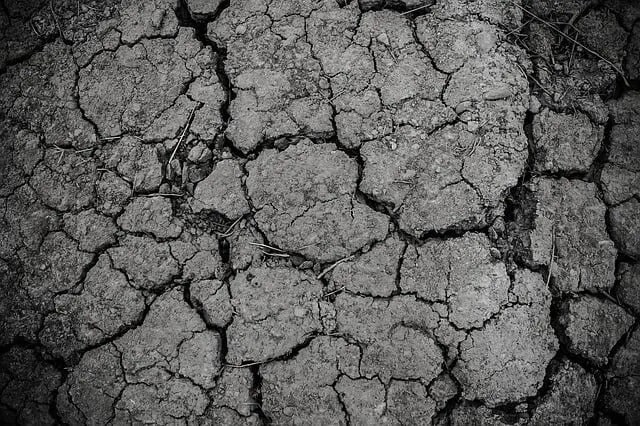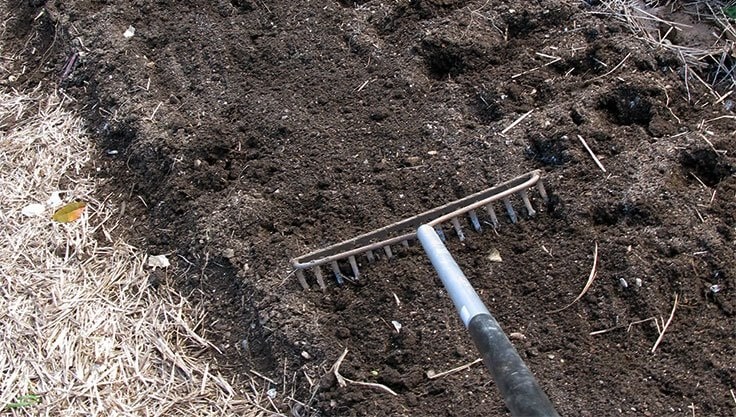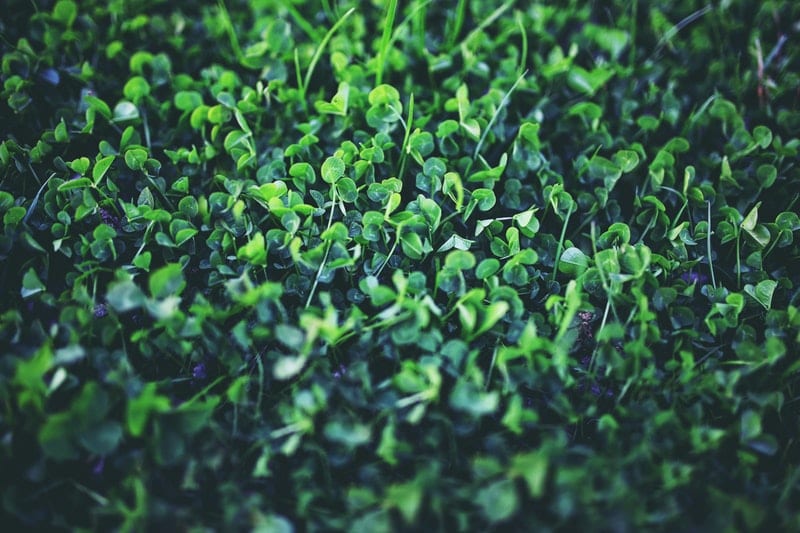
Clover may be a good luck charm for most people, but if the clover is found in the lawn, the bliss quickly comes to an end. The clover can quickly become a nuisance and attack the lawn. In the process, the clover in the lawn is so aggressive that it can displace the lawn. However, in order to avoid gaps in the lawn and allow it to regain its full vigor, there are a few ways to combat or prevent clover in the lawn.
In addition to the causes of clover in the lawn, you will also learn simple tips and home remedies that can be used to drive clover out of the lawn again.
Contents
Causes of clover in the lawn
Normally, healthy lawns should be hardy enough to prevent clover from accumulating there. Once the lawn covers the entire ground area, there is actually no space there for clover to spread.
In fact, with a healthy lawn, there is no way for the clover to spread. Therefore, clover in the lawn is a sign that there is a deficiency and the lawn is not doing very well.
You can tell exactly which deficiency is prevalent by looking at the variety of clover, among other things. In general, however, a nitrogen deficiency is a cause for clover to accumulate in the lawn. Clover has better properties to react to a nitrogen deficiency than the lawn. This causes the grass blades to decline while the clover continues to spread well.
However, depending on the clover variety, other deficiencies may be present.
If white clover is growing on your lawn then this is a general indication that the soil is either too calcareous, or low in nutrients. In fact, white clover can do well with just a few resources and can therefore spread well even in rather poor soils.
However, the situation is different with wood sorrel. As its name suggests, it prefers soil that is rather poor in lime and acidic. So if you find wood sorrel in your lawn you should use a pH meter to check the pH of your lawn.
One clover that is particularly adapted to low nitrogen soils is horn clover.
Preventing clover in your lawn
Now that the causes have been explained, the easiest way to prevent clover from growing is to prevent it. Since nitrogen depletion is one of the main reasons clover can spread in lawns, so you should provide more nitrogen in the soil. You can address nitrogen depletion in several ways.
First, make sure the lawn is getting enough fertilizer. If the last treatment with a fertilizer was some time ago, then clover is a serious sign that the soil needs a new fertilizer again.
However, if you have recently fertilized the lawn and yet there is a nitrogen deficiency, then you should not treat the lawn directly with the next fertilizer. Horn meal is particularly suitable for this purpose. With horn meal, you can add nitrogen to the soil in a targeted manner without positively influencing the growth of the clover. You should also keep in mind that normal fertilizer could also have a positive effect on the clover.
In addition, you should pay attention to sufficient watering of the lawn. Especially in the summer months, there is a risk that the lawn dries out and the blades of grass are quickly undersupplied. The clover, on the other hand, also manages with less water and can therefore spread better than the lawn in dry conditions.
Last but not least, the lawn should not be mowed too short. Indeed, clover has the disadvantage that it requires a lot of light, but at the same time is not very tall. If you notice that clover is spreading on your lawn, you should stop mowing and let it grow a little longer. In this way, you deprive the clover of the much-needed light and massively weaken the clover.
5 measures against clover in the lawn
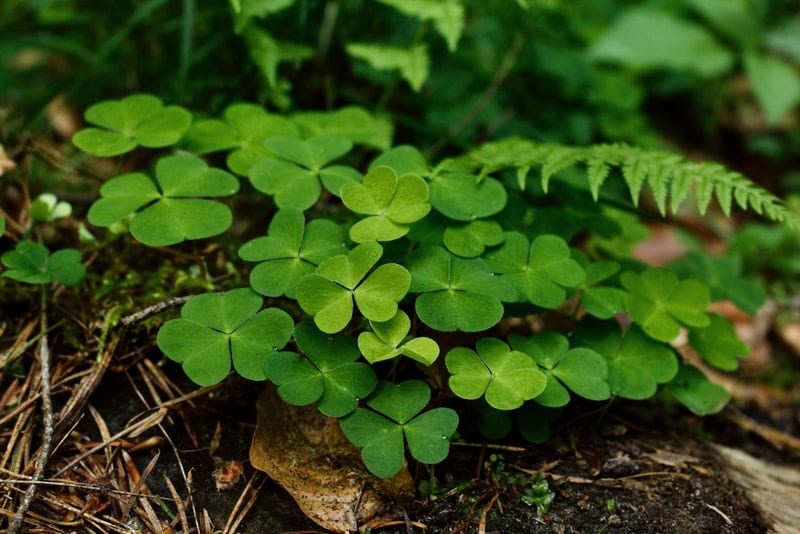
However, if the clover has already spread strongly then the preventive measures help only to a very limited extent. If the health of the lawn is already so severely attacked that bare patches can be observed and these are increasingly taken over by clover, then you should not hesitate but act.
With the following 5 tips, you can take action against clover and also ensure a healthier lawn. The ultimate goal and also the best way to get rid of clover in the lawn is still to ensure a healthy lawn.
Fertilizing clover
As already shown in the preventive measures, fertilizing is definitely a good way to get rid of clover in the lawn. When fertilizing, the procedure should be to first mow the lawn. However, the length of the lawn should not be less than 4cm.
The shorter the lawn, the easier it is for the clover to spread in the lawn. So if the clover is already visible, let the lawn grow a little longer and fertilize it anyway.
Before you start fertilizing, however, you should take other precautions. Since the fertilizer could also cause the clover to gain strength, it should be removed beforehand. This means that you either remove all clover nests with a spade, or take the help of the hand dethatcher.
In any case, this preparatory measure is laborious, but it is necessary so that only the lawn benefits from the fertilizer, and not, for example, the clover. You should also reseed the lawn areas that have been particularly affected by the clover. After all, if you have been thorough and removed the clover, your lawn will look more like a battlefield.
Driving out the clover by fertilizing alone is only recommended for smaller areas and a rather moderate clover infestation. The advantage, however, is that once the clover is eliminated, it won’t reappear anytime soon.
Chemical weed killers
If the infestation of clover is so severe that manual removal using a scarifier is almost impossible, then more effective means must be used. Although chemical means should be avoided in the garden, there are of course weed killers that can be used against clover.
The weed killers work in such a way that you attack only dicotyledonous plants. Among these is the clover. Monocotyledonous plants such as the grass blades are spared from these chemical weed killers.
The herbicides deprive the clover of the opportunity to absorb new nutrients. This will cause it to die in the long run and the lawn will have more room to flourish again.
However, chemical weed killers do not work immediately. The effective time can be a good three weeks, so some patience is required before the clover disappears again.
In addition, when applying the weed killer, attention must be paid to the wind direction and the weather. These have a great influence on how the herbicide works. Thus, it should be avoided in strong winds to apply the chemical weed killer.
Likewise, the lawn should not be walked on by children or pets for several hours. Even though the weed killer is not a major hazard, there should still be no health risk and the lawn should not be walked on for a few hours.
Once the treatment is completed and the clover is eliminated, a basic maintenance treatment of the lawn is in order. For this it is recommended to mow the lawn and treat it with a fertilizer.
Depriving clover of light
So far, it seems that clover is ahead of the lawn in terms of strength. It copes very well with nutrient-poor soils, and even sensitive drought is hardly a problem for clover.
However, clover does have one weakness and that is that it needs high amounts of light to grow. Compared to the lawn, it even needs a much larger amount of light and it is exactly this circumstance that you can use to get rid of the clover.
Namely, now you fight the clover by depriving it of light.
To do this, take an opaque tarp and cover the lawn with it. This will deprive the clover of light and within a few weeks it will have receded. However, how long you need to place the tarp over the lawn depends on the severity of the infestation. However, a maximum duration of four weeks should be sufficient to get rid of the clover in any case.
The advantage of this method is clearly that it is very natural and effective at the same time. Unlike the chemical weed killer, you do not have to deal with chemical agents that could eventually pollute your garden.
However, the tarp looks anything but pretty visually. In addition, of course, the lawn is also deprived of light, which is why it is also weakened.
Unlike clover, however, the lawn can react better to this deprivation of light and with a little care it will regain its old vigor in no time. Therefore, it is recommended to fertilize the lawn once after the measure and to repair bare patches with new seeds.
Removing clover by scarifying
The scarifier is a real secret weapon in the garden arsenal. With the help of the scarifier can not only ensure better health of the lawn, but it is also ideal to eliminate clover in the lawn.
In this case, the scarifier is simply applied so that the lawn is processed normally. The clover is damaged by the treatment to such an extent that it can no longer grow in the long term.
The clover is more sensitive than the lawn and the roots of the clover are damaged by the scarifier.
The second positive effect is that the dethatching adds more oxygen to the lawn. As a result, the lawn regains its strength and can easily displace the clover.
Subsequently, the lawn can be fertilized again to prevent a new infestation.
Home remedies against clover
If the infestation of clover is still manageable and you can still tolerate the sight of it, then you can also try to eliminate the clover with simple home remedies. These have the advantage that you spare both nature and your wallet and the effort is relatively small. Whether the home remedies show effect, however, is not necessarily guaranteed.
The best known home remedy against clover is the use of boiling water. The boiling water is simply poured over the affected areas and then the killed plant remains are collected. The clover is more sensitive here than the lawn and so you can step by step remove the clover from your lawn.
Horn shavings are also suitable for defeating the clover in the lawn. Horn shavings contain the much-needed nitrogen that helps the lawn regain its former strength. After all, as explained earlier, one of the main causes of clover is that the soil does not contain enough nitrogen.
Often, the use of vinegar and salt is also recommended in the fight against clover. However, this is not only not recommended due to its dubious effect, but also prohibited in most cases. The salt can quickly cause ecological damage, and your garden is also unlikely to be pleased with this salty gift.


